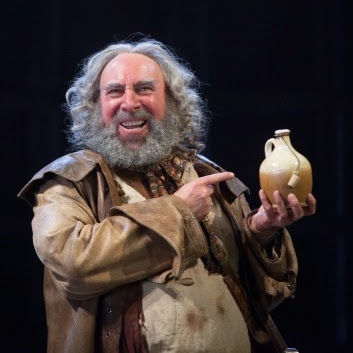Matt Trueman: Why is alcohol such a prominent part of theatregoing?

© RSC
Had it been an usher, I'd have thought no more of it – them's just the rules – but a director demanding as much changes things. It makes it a matter of art. It becomes a condition of spectatorship. This, it says, is a show to be seen sober.
I get that. Songs of Lear is a song cycle, with movement, that seeks to entrance its audience. The voices get into your body, your blood pumps in time and you start to drift. It's a show you get lost in; one you absorb. As with hypnosis, you start to forget yourself.
A glass of wine – or, indeed, any other drink – would get in the way of that. The act of drinking takes attention. Even the heaviness of the glass will take up brain space. You have to think to stop yourself spilling it. All that stops you giving yourself over to the show.
If that's true, then, why is alcohol such a prominent part of theatregoing? Go to the cinema, you eat popcorn. Go to the theatre, you have a glass of wine or a G&T. (And, of course, complain about the price.)
Personally, I don't. Call me Wayne Wheeler, but I like to stay as sharp as possible in the theatre. That's my job – and, anyway, I'm a lightweight. (No use throwing the free wine line at me, though historically, criticism's not the most sober of professions. Empty days and expense accounts didn't exactly encourage abstinence.)
Thing is, you don't need a cheeky shot to read a book and you wouldn't look at art through pinhole pupils. In fact, visual art only really comes with wine at private views – and they're as much about socialising or networking as they are art.
'Booze is so woven into theatre that I suspect it has a role to play'
However, others disagree. My wine-smuggling friend is a critic himself and happily goes in for a glass in the interval. Afterwards, in the pub, he told me he sees himself like any other audience member and so drinks accordingly. Theatre, he reckons, is best enjoyed with wine.
Why so? Like everything in life, it goes back to Greece and childhood. The Greek god Dionysus had a threefold remit: god of wine, theatre and ritual madness. (Basically, this is the best job going.) His Dionysia festivals were drunken and dramatic, all plays and piss-ups. For children, the best bit of the theatre is the interval ice-cream. We come to expect a treat and, at a certain age, booze just beats ice-cream.
It's partly a class thing, too. These are polite, middle-class drinks for polite, middle-class entertainment. (Sob. Grr. Etc) You don't get many CAMRA-approved casks in theatre. Our bladders couldn't take it, for one thing, and beer tends to be the preserve of festivals, thanks to shorter shows and sponsorship deals. (Possibly stag dos, too.)
However, booze is so woven into theatre that I suspect it has a role to play. Certainly, bar takings help prop up the art – and it's possible that we've been conditioned into spending as such – but it runs deeper than that. Maybe a drink eases us into a bizarre art-form. Maybe it defuses our defences and allows a play to get through and go to work. Maybe a glass takes the edge off.
For most people, theatre happens after work. (Not for critics, obviously.) It's a leisure activity and, often, a social occasion. It's art, yes, but it's also entertainment – particularly in Britain, given our history of playhouses and music halls – and a bit of booze might serve to oil the cogs. It warms us up as an audience. Drink's a loosener. The last word could only be Falstaff's: "Man cannot make him laugh; but that's no marvel – he drinks no wine."










